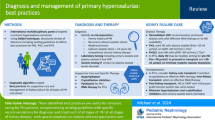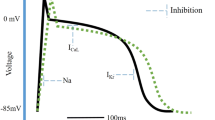Abstract
Background
Amiodarone is a very effective antiarrhytmic drug. However its use may be accompanied by side effects. Hyperglobulinemia was not described in association with amiodarone treatment.
Materials and methods
Fifteen patients, who developed hyperglobulinemia while on amiodarone therapy, were identified among the patients hospitalized in our hospital. Serum globulin concentration was measured prior to, during and after amiodarone therapy.
Results
In 11 of the 15 patients with amiodarone-associated hyperglobulinemia, amiodarone treatment had to be stopped because of amiodarone-induced complications, nine of them had pneumonitis. Mean serum globulin level rose during amiodarone therapy from 2.48 ± 0.51 g/dL to 4.11 ± 0.71 g/dL (p = 0.001), and declined after it was stopped to 2.80 ± 0.49 g/dL (p = 0.001). In 50 patients treated by amiodarone, serum globulin was similar to that found in 50 patients with ischemic heart disease not treated by amiodarone [2.64 ± 0.39 g/dL and 2.56 ± 0.29 g/dL respectively (p = 0.21)].
Conclusions
In some patients amiodarone therapy may be associated with hyperglobulinemia. The incidence of this association is not known. Most of the patients with amiodarone-associated hyperglobulinemia have amiodarone-induced toxicity, mainly pneumonitis. Amiodarone therapy does not cause a general increase in serum globulins. Hyperglobulinemia may be a marker for a damaged organ, or it may have a pathogenetic role in the induction of pneumonitis.

Similar content being viewed by others
References
Connolly SJ. Evidence-based analysis of amiodarone efficacy and safety. Circulation 1999;100:2024–34.
Pollak PT. Clinical organ toxicity of antiarrhytmic compounds: ocular and pulmonary manifestations. Am J Cardiol 1999;84:37R–45.
Wilson SW, Podrid PJ. Side effects from amiodarone. Am Heart J 1991;121:158–71.
Pitcher WD. Amiodarone pulmonary toxicity. Am J Med Sci 1992;303:206–12.
Podrid PJ. Amiodarone: reevaluation of an old drug. Ann Intern Med 1995;122:689–700.
Dusman RE, Stanton MS, Miles WM, Klein LS, Zipes DP, Fineberg NS, et al. Clinical features of amiodarone-induced pulmonary toxicity. Circulation 1990;82:51–9.
Heath MF, Costa-Jussa FR, Jacobs JM, Jacobson W. The induction of pulmonary phospholipidosis and the inhibition of lysosomal phosholipases by amiodarone. Br J Exp Pathol 1985;66:391–7.
Martin WJ, Rosenow EC. Amiodarone pulmonary toxicity. Recognition and pathogenesis. Chest 1988;93:1242–8.
Baritussio A, Marzini S, Agostini M, Alberti A, Cimenti C, Bruttomesso D, F. Amiodarone inhibits lung degradation of SP-A and perturbs the distribution of lysosomal enzymes. Am J Phsiol Lung Cell Moll Physiol 2001;281:L1189–99.
Reasor MJ, Kacew S. An evaluation of possible mechanisms underlying amiodarone-induced pulmonary toxicity. Proc Soc Exp Biol Med 1996;211:297–304.
Amiodarone Trials Meta-Analysis Investigators. Effect of prophylactic amiodarone on mortality after acute myocardial infarction and in congestive heart failure: meta-analysis of individual data from 6,500 patients in randomized trials. Lancet 1997;350:1417–24.
Singh SN, Fisher SG, Deedwania PC, Rohatgi P, Singh BN, Fletcher RD. Pulmonary effect of amiodarone in patients with heart failure: the congestive heart failure-survival trial of antiarrhytmic therapy (CHF-STAT) investigators. J Am Coll Cardiol 1997;30:514–7.
Ashrafian H, Davey P. Is amiodarone an underrecognized cause of acute respiratory failure in the ICU? Chest 2001;120:275–82.
Kanji Z, Sunderji R, Gin K. Amiodarone-induced pulmonary toxicity. Pharmacotherapy 1999;19:1463–6.
Akoun GM, Gauthier-Rahman S, Milleron BJ, Perrot PY Mayaud CM. Amiodarone-induced hypersensitivity pneumonitis. Evidence of an immuological cell-mediated mechanism. Chest 1984;85:133–5.
Manicardi V, Bernini G, Bossini P, Bertorelli G, Pesci A, Bellodi G. Low-dose amiodarone-induced pneumonitis: evidence of an immunologic pathogenetic mechanism. Am J Med 1989;86:134–5.
Ott MC, Khoor A, Leventhal JP, Paterick TE, Burger CD. Pulmonary toxicity in patients receiving low-dose amiodarone. Chest 2003;123:646–51.
Fan K, Bell R, Eudy S, Fullenwider J. Amiodarone-associated pulmonary fibrosis. Evidence of an immunologically mediated mechanism. Chest 1987;92:625–30.
Rabinowe SL, Larsen PR, Antman EM, George KC, Friedman PL, Jackson RA. Amiodarone therapy and autoimmune thyroid disease. Increase in a new monoclonal antibody-defined T cell subsets. Am J Med 1986;81:53–7.
Sato K, Yamazaki K, Kanaji Y, Ohnishi S, Kasanucki H, Demura H. Amiodarone-induced thyrotoxicosis associated with thyrotropin receptor antibody. Thyroid 1998;8:1123–6.
Bartalena L, Grasso L, Brogioni S, Martino E. Serum interleukin-6 in amiodarone-induced thyrotoxicosis. J Clin Endocrinol Metab 1994;78:423–7.
Breuer HW, Bossek W, Haferland C, Schmidt M, Neumann H, Gruszka J. Amiodarone-induced severe hepatitis mediated by immunological mechanisms. Int J Clin Pharmacol Ther 1998;36:350–2.
Author information
Authors and Affiliations
Corresponding author
Rights and permissions
About this article
Cite this article
Mouallem, M., Antipov, N., Mayan, H. et al. Hyperglobulinemia in Amiodarone-induced Pneumonitis. Cardiovasc Drugs Ther 21, 63–67 (2007). https://doi.org/10.1007/s10557-007-6006-6
Received:
Accepted:
Published:
Issue Date:
DOI: https://doi.org/10.1007/s10557-007-6006-6




